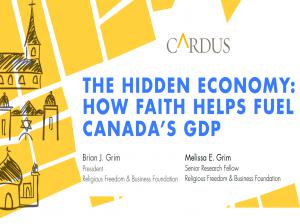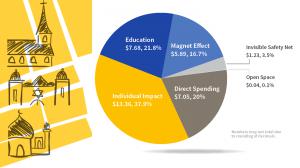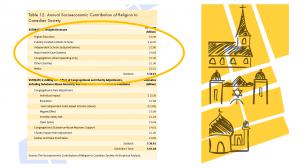Religion adds $67.5 billion to Canadian economy every year
New research suggests religion produces measurable economic contributions to the common good
New research suggests religion produces measurable economic contributions to the common good
This study provides the first documented quantitative national estimates of the economic value of religion to Canadian society. The study was conducted for Cardus by the veteran father-daughter research team, Brian J. Grim, Ph.D., and Melissa E. Grim, JD, of the Religious Freedom & Business Foundation.
FOR IMMEDIATE RELEASE
Amid pandemic-related job loss and economic worries, new research suggests there is a sector of Canadian society that plays an important, but often unrecognized, economic role: religion. The Hidden Economy: How Faith Helps Fuel Canada’s GDP, a new report from think tank Cardus, finds that religion’s annual contribution to Canadian society is worth an estimated $67.5 billion. That’s large enough to be the ninth biggest enterprise in the country – ahead of the Bank of Montreal.
The $67.5 billion figure is the mid-range estimate in The Hidden Economy: How Faith Helps Fuel Canada’s GDP. More than half of the $67.5 billion figure comes from the activities of tens of thousands of religious congregations (churches, temples, mosques, and synagogues) in Canada. Nationwide, they have a $35-billion “halo effect” – the value congregations provide to their surrounding communities.
Canadian Religious Congregations’ Halo Effect
The halo effect of religious congregations is a well-studied phenomenon. For more information on the halo effect in Canada, including municipality-specific calculations, please visit haloproject.ca. Also see related research on the United States here.
The balance of religion’s estimated $67.5 billion contribution to Canadian society comes through activities related to schooling, health care systems, charities, media, lives saved through congregational substance abuse support programs, as well as kosher and halal food sales.
“Religion is an active force in the public, professional, and private lives of many Canadians and contributes to the common good of all, including those who are not religious,” said Brian Dijkema, vice president of external relations at Cardus. “If religious activity is hindered—through zoning, regulation, taxation, or even intolerance—there are massive economic spill-over effects that negatively affect Canadians as a whole. We all benefit economically when religious life thrives.”
The Hidden Economy: How Faith Fuels Canada’s GDP is freely available online.
-##-
MEDIA INQUIRIES
Daniel Proussalidis
Cardus – Director of Communications
613-899-5174
media@cardus.ca
About Cardus
Cardus is a non-partisan, faith-based think tank and registered charity dedicated to promoting a flourishing society through independent research, robust public dialogue, and thought-provoking commentary. To learn more, visit their website, follow them on Twitter, and like them on Facebook.
About RFBF
The Religious Freedom & Business Foundation (RFBF) is the preeminent organization dedicated to educating the global business community, policymakers, non-government organizations and consumers about the positive power faith — and religious freedom for all — has on business and the economy. To learn more, visit us at the links below.
Brian J Grim
Religious Freedom & Business Foundation
+1 814-574-8672
email us here
Visit us on social media:
Facebook
Twitter
LinkedIn
Faith Fuels Canada’s Economy
Legal Disclaimer:
EIN Presswire provides this news content "as is" without warranty of any kind. We do not accept any responsibility or liability for the accuracy, content, images, videos, licenses, completeness, legality, or reliability of the information contained in this article. If you have any complaints or copyright issues related to this article, kindly contact the author above.



